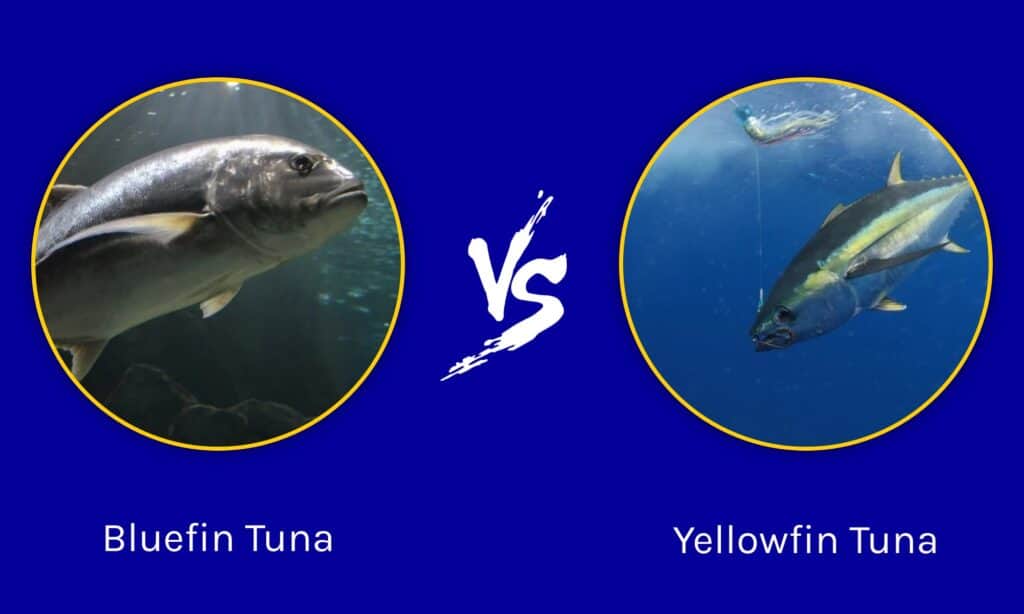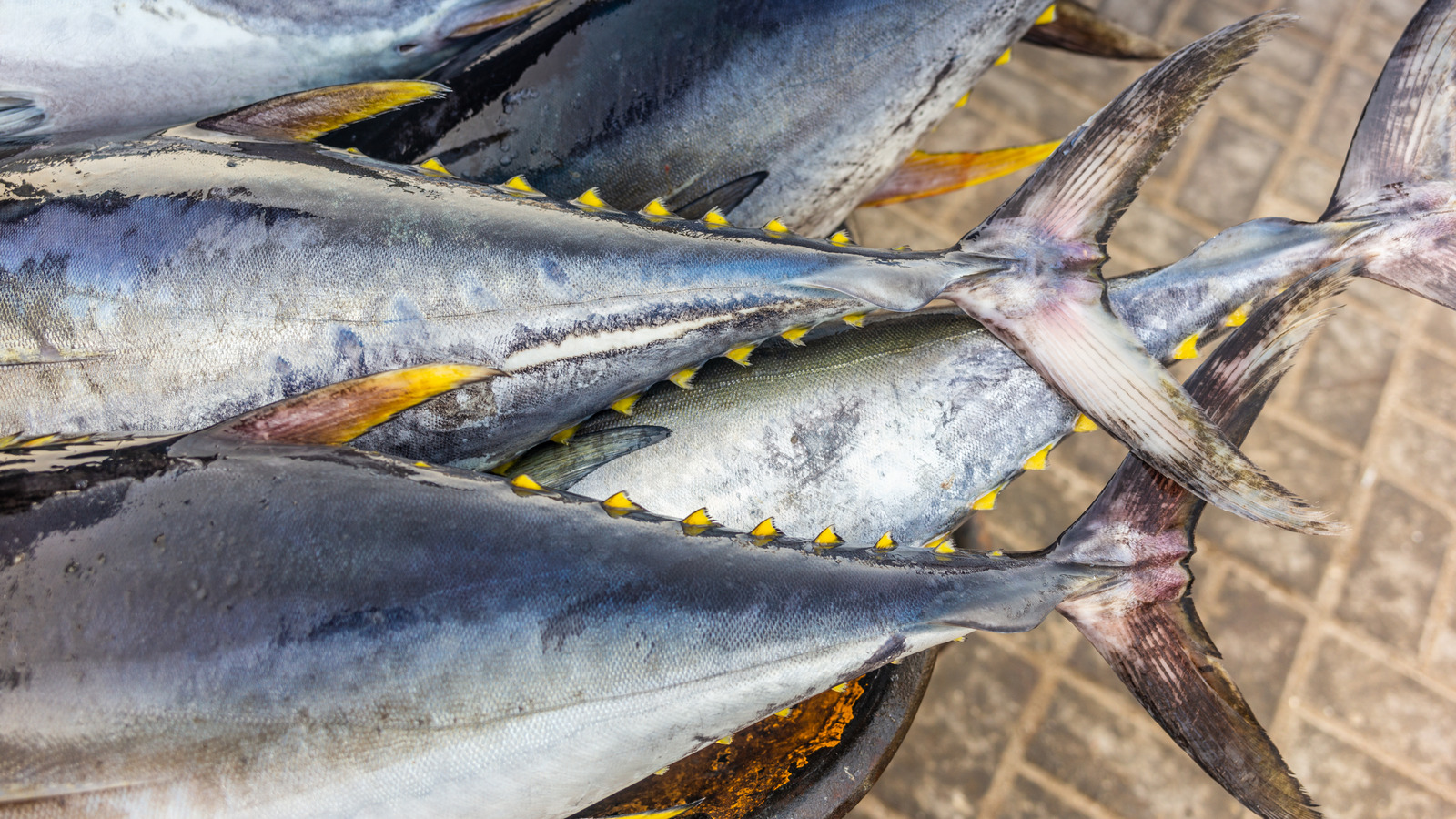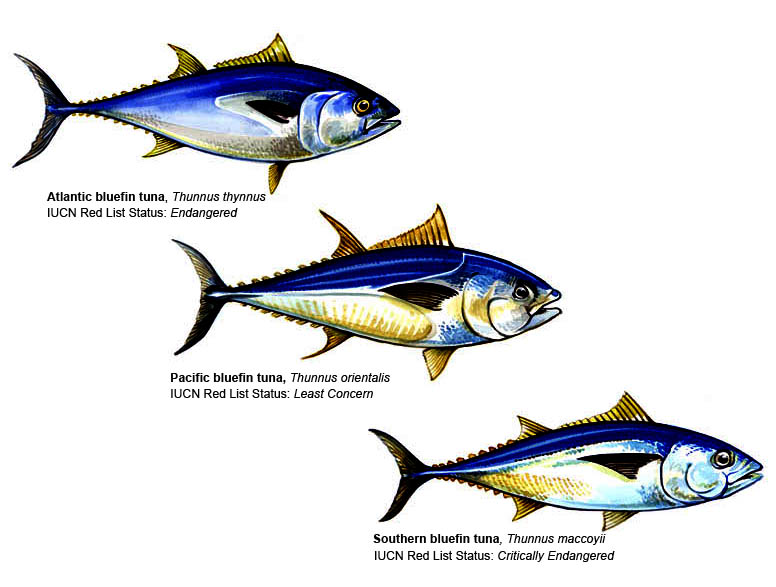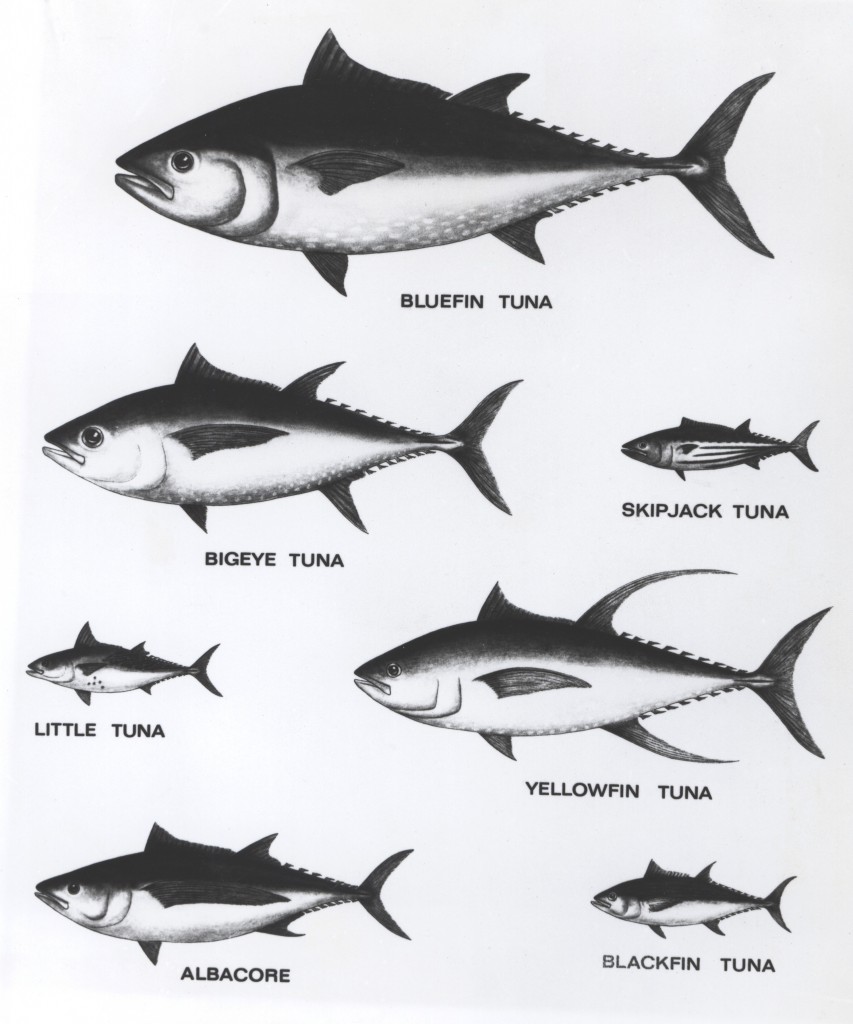Bluefin vs Yellowfin Tuna Look, Taste, Cost, Nutrition Ouachita

Bluefin vs Yellowfin Tuna Look, Taste, Cost, Nutrition Ouachita
On the outside, bluefin tuna are metallic blue and silver and have yellow-green fins. Compared to different kinds of tuna, bluefin tuna are a bit squat and have subtle white striations. They are most commonly confused with yellowfin, but the main difference is that bluefins have a blue-green lateral line running down the sides of their body.

Catch and Cook Yellowfin Tuna vs Bonito (AKA Little Tunny) YouTube
These are Skipjack, Albacore, Yellowfin, Bigeye, and Bluefin Tuna. Each of these five Tunas boasts a different texture of meat, a different color, and different taste. Thanks to these characteristics, certain species are better suited for meals like salads, while others are perfect for steak or sushi. The variety doesn't stop there, however.

Bluefin vs Yellowfin Tuna What are the Differences? AZ Animals
The pectoral fin of yellowfin reaches just beyond the beginning of the second dorsal fin. 2. The second dorsal fin has yellow coloring. 3. The tail fin has yellow and grey coloring. To purchase your NMFS Atlantic tuna permit, visit https://hmspermits.noaa.gov. Learn how to identify and distinguish the differences between bluefin tuna and.

Bluefin Vs. Yellowfin Tuna What's The Difference?
Related: Fluke Vs Flounder: Understanding The Differences And Similarities. Yellowfin tuna have a relatively large head compared to their body size, with a pointed snout and a mouth filled with sharp teeth. Their eyes are large and provide excellent vision, helping them spot prey and navigate through the depths of the ocean. Bluefin Tuna Appearance

Differences Between Bluefin and Yellowfin Tuna Sportfishing Lures
One of the most notable differences between bluefin tuna and yellowfin tuna is their appearance. Bluefin tuna tend to be larger and heavier than yellowfin tuna, with a maximum length of around 10 feet and a weight of up to 1,500 pounds. Yellowfin tuna, on the other hand, are typically smaller, with a maximum length of around 7 feet and a weight.

Maps Global Tuna Management The Pew Charitable Trusts
Tuna Species Compared. These three species are the most common tuna in the U.S. that anglers are likely to target. Bluefin are the largest, easily reaching 500 pounds while yellowfin usually grow to about half that size. By comparison, blackfin top out around 40 pounds and are the smallest tuna species. The appearance of these fish is also.

Yellowfins and Bluefins and Bigeyes Oh My Ocean City MD Fishing
4. The tail on a Bluefin is dark blue in color, unlike the yellow-and-gray combination on a Yellowfin. Again, that might be a little difficult to grasp, so let's take a look at what these differences actually look like. Bluefin vs. Yellowfin Tuna Taste. Bluefin Tuna are the most prestigious and luxurious fish money can buy.

Identifying Bluefin vs. Yellowfin Tuna theLAB.earth
The key differences between bluefin and yellowfin tuna include: 1) Size - Bluefin tuna can reach sizes of over 1,000 lbs. while yellowfin tuna rarely reach over 500 lbs; 2) Color - Yellowfin Tuna have a distinct yellow lateral line from their head to their tail above the pectoral fins. Also the second pectoral fin on yellowfin tuna are elongated and bright yellow while those on bluefin tuna.

Charlotte International Trade Inc — Nautical Design Wall Plaques
The size of bluefin tuna is considerably greater than that of yellowfin tuna. Bluefins weigh up to 1,000 pounds. Yellowfins weight between 400-500 pounds. Classifying younger bluefins as adult yellowfin relatives, on the other hand, might be difficult. Fortunately, there are a few key features that distinguish them:

Bluefin vs Yellowfin Tuna Main Differences Ocean Info
The bluefin's torpedo-shaped body speeds through the water, sighting prey with the sharpest vision of fish of their kind, and they can dive more than 3,000 feet deep. Yellowfin, though.

Fish, Salmon farming, Fish farmers
Firstly, most Bluefin Tuna grow significantly larger than Yellowfin Tuna. Atlantic Bluefin Tuna is the largest of the bluefin varieties, reaching up to 680kg and rivalling the marlin and swordfish in size. Australia's Southern Bluefin Tuna is somewhat smaller, commonly around 1.8m in length and 100kg in weight when fully matured.
:max_bytes(150000):strip_icc()/varieties-of-tuna-1808817-final-5c0e908446e0fb00019342cb.png)
What Is Tuna?
The bluefin's tail is very often a dark blue color, but might sometimes appear as dark gray in some regions. This contrasts to the yellowfin's tail, which is more distinctly yellow in color and might have a slight grayish coloration. The shape and profile of both the yellowfin vs bluefin tuna's tails are very similar in every other.

Yellowfin Tuna Swimming
Bluefin and yellowfin tuna are caught throughout the Atlantic, Pacific, and Indian Oceans, and while both types of fish are prized for their meat, the two species differ in color, size, habitat.

Quick Guide Albacore vs Yellowfin Tuna Tom's Catch Blog
Differences Bluefin vs Yellowfin Tuna. It's fun to watch the distinctive features between the two species. The first things to note are their appearance and sizes differing factors. Appearance & Size. In term of size, there's a significant difference between the Bluefin vs Yellowfin Tuna. Bluefin tuna may grow to be more than 1,000 pounds.

Tuna Facts Tuna Recipes
Bluefin vs Yellowfin Tuna Cost. Bluefin Tuna is perhaps the most sought-after commercial fish worldwide. This is one of reasons that Bluefin Tuna is a very expensive fish. A 600-pound specimen sold for $3 million in a Japanese auction. It is primarily consumed in sashimi by Japan. The average price for Atlantic bluefin is around $200 per pound.

The four main tuna species in the tropical and subtropical waters of... Download Scientific
Bluefin vs Yellowfin Tuna: Culinary price point. Bluefin tuna is among the most expensive fish in the world. ©funny face/Shutterstock.com. The bluefin tuna may be the most sought-after commercial fish in the world. It is an extremely expensive fish, with the current record being a 600-lbs bluefin selling for $3 million at a Japanese auction.